Pennsylvania Station
370 Seventh Avenue (btw 31st/33rd Streets, 7th/8th Avenues)
The original Pennsylvania Station was built between 1903 and 1910 by the Pennsylvania Railroad Company. The project included the first rail tunnels under the North (Hudson) River, permitting Pennsylvania Railroad trains to enter Manhattan directly from New Jersey. The station was designed by Charles Follen McKim (1847-1909), William Rutherford Mead (1846-1928) and Stanford White (1853-1906). The placement of the tracks underground as they entered the station resulted in an elegant terminal that lacked the obtrusive towers and train sheds that characterized most other rail terminals throughout the country. The station was viewed as a grand gateway to the city during the golden age of railroading. (Source: Historic American Buildings Survey)
The supplanting of railroads by auto and air travel in the middle 20th Century left the Pennsylvania Railroad wallowing in debt and unable to adequately maintain the large facility or resist offers to purchase the air rights from the station. Despite fierce community opposition, the building was demolished in 1964 and replaced with Pennsylvania Plaza, which included office buildings and a new Madison Square Garden. What was once a grand entrance into the city became a fetid basement. However, the destruction of Penn Station resulted in the birth of the modern landmarks preservation movement, which succeeded in saving a number of other architecturally important structures throughout the city.
Madison Square Garden is three lies in one. It's round, it's ten blocks north of Madison Square and you don't want to eat anything that grows there. This is actually the fourth Madison Square Garden. The first Madison Square Garden was an open air arena built in 1879 at 26th Street and Madison Avenue on the site of the old New York and Harlem Railroad passenger depot (which was replaced by Grand Central Terminal). The second Garden was a Moorish building designed by Stanford White built in 1890 on the same site. The second Garden was demolished in 1924 for the construction of the New York Life Insurance Building. The third Garden was built in 1925 at 50th Street and Eighth Avenue on the site of the city's former streetcar barns. The third Garden was architecturally unremarkable and the building was notable primarily as a venue for hockey and boxing. The third Garden was demolished in 1976 and replaced in 1984 by Worldwide Plaza. The fourth Garden (pictured here) opened in 1968.
The James A. Farley Post Office, which sits just west of Penn Station across Eighth Avenue, was designed by the same architects as the old Penn Station and built around the same time. Since the tracks run directly under the building, the building presents the prospect of at least partially undoing the mistake of history and building a new Penn Station in the old building. Former NY Senator Daniel Patrick Moynihan was a champion of the idea, although, as of this writing, the project is stalled due to a lack of funding and real estate developers trying to find a way to add to their fortunes with this public project.
To the southwest of the Farley Post Office is the Morgan General Mail Facility (341 Ninth Avenue), which was built in 1933 as part of a New Deal building program that was responsible for numerous new postal buildings around the country. The design is credited to James A. Wetmore, who was Acting Supervising Architect of the Public Works Branch of the U.S. Post Office Department. The six-story building is faced in light tan brick and has corbelled brick pilasters and a limestone belt course, friese, cornice and coping. The building was originally designed to host a railroad spur from the High Line.
Much of the interior was destroyed by a fire in 1968 and the building was renovated in 1974. The three-story Morgan Facility Extension building to the south was added around 1992, possibly resulting in demolition of an old public bath facility.
As the rail tracks head toward the Hudson River tunnels, they pass through under buildings and through an open air yard between 9th and 10th Avenues.
West of 10th avenue is a train yard for the Long Island Railroad, which has long been coveted for commercial development, most notably a proposed football stadium which was derailed by community and business opposition in 2005.
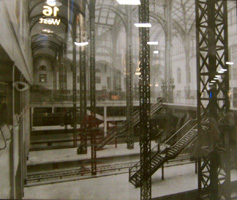
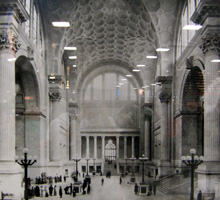
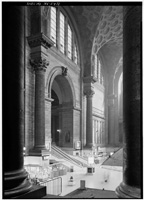
Old Penn Station waiting room (HABS)
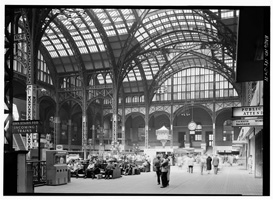
Old Penn Station Concourse (HABS)
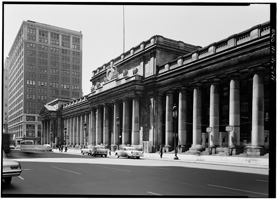
Seventh Avenue Entrance (HABS)
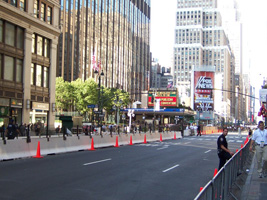
Seventh Avenue
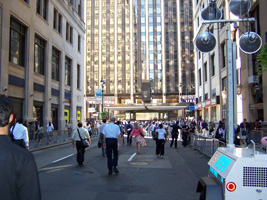
Seventh Avenue - 32nd Street
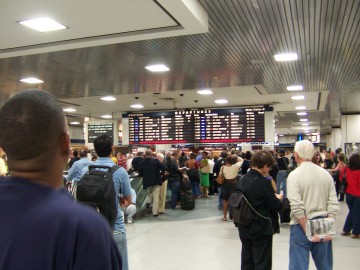
Departure board
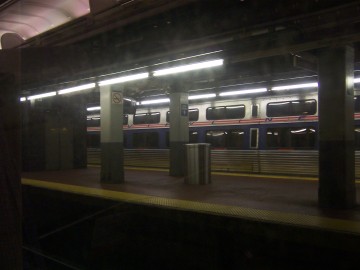
Amtrak Superliner at a platform
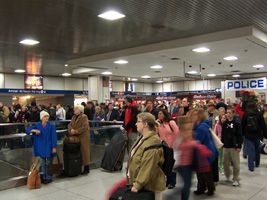
Waiting to board trains
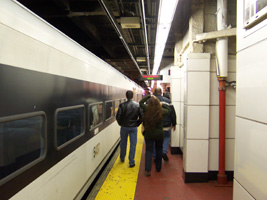
NJ Transit train at a platform
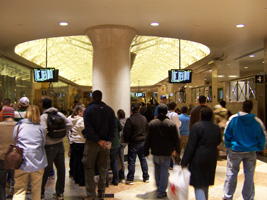
Passageway
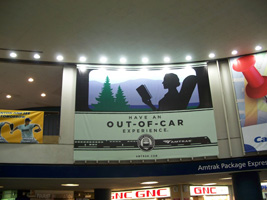
Amtrak ads in Penn Station
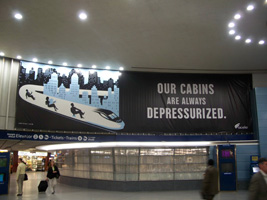
Amtrak ads in Penn Station
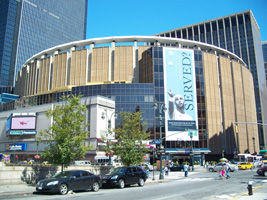
Madison Square Garden
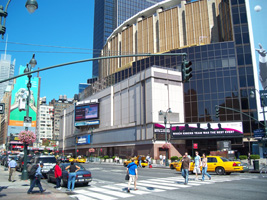
Madison Square Garden
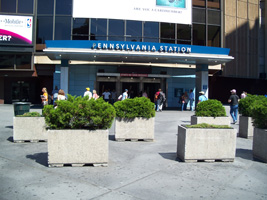
Penn Station entrance under the Garden
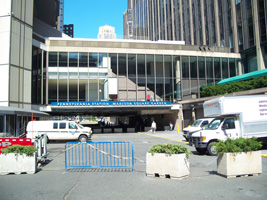
Entrance between the Garden and Two Penn Plaza
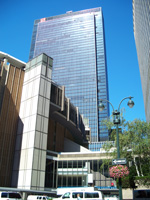
One Penn Plaza rising over Madison Square Garden
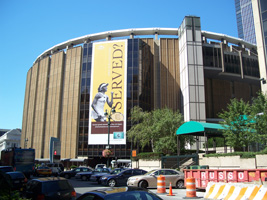
Madison Square Garden
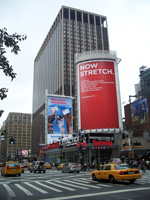
Seventh Avenue / Two Penn Plaza
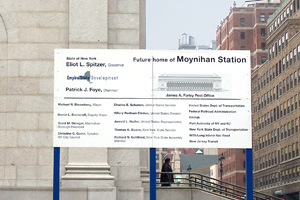
Sign for Moynihan Station
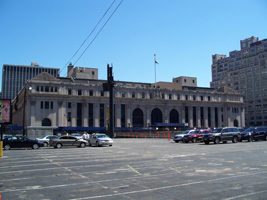
West side of the post office
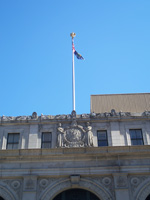
Flag pole on the post office
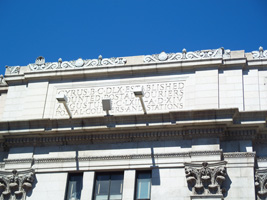
Engraved sign on the south side of the post office
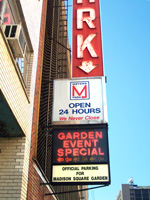
Parking garage sign
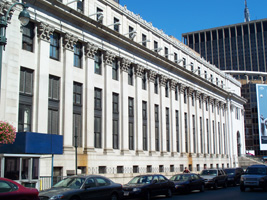
South side of the post office
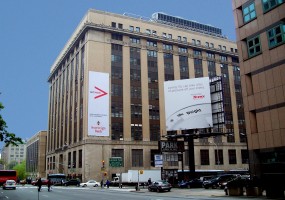
Morgan General Mail Facility
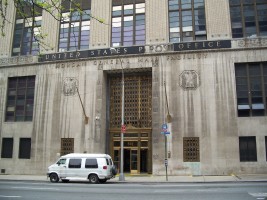
Morgan General Mail Facility
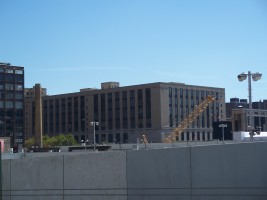
Morgan General Mail Facility
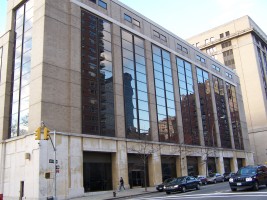
Morgan Facility Extension
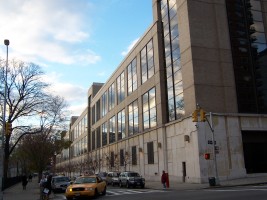
Morgan Facility Extension
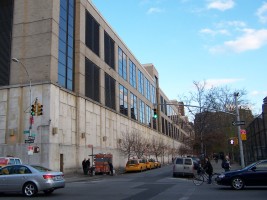
Morgan Facility Extension
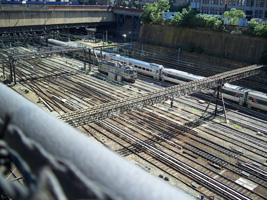
Rail yard west of the post office
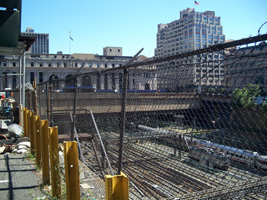
Rail yard west of the post office
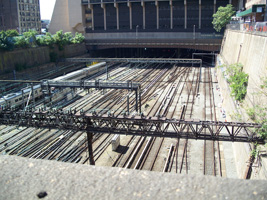
Rail yard west of the post office
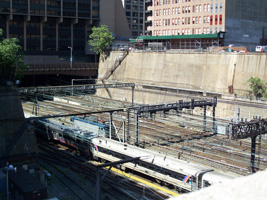
Rail yard west of the post office
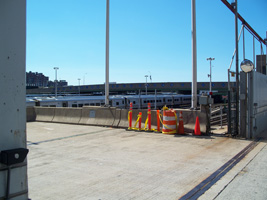
LIRR train yard